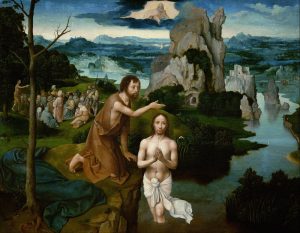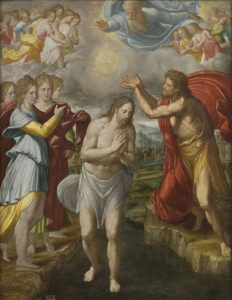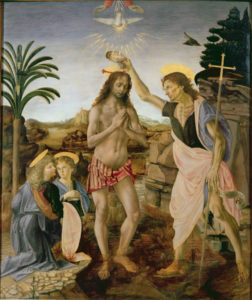Illuminations on the Lectionary readings for Jan. 8, 2023 (Epiphany 1A/Baptism of our Lord)
First Reading: Isaiah 42:1-9
The season after Epiphany now begins and will continue until Ash Wednesday and the beginning of Lent on February 22.

The Baptism of Christ (1510-1520), oil painting on oak by Joachim Patinir (c.1480-1524). Kunsthistorisches Museum, Vienna, Austria. (Click image to enlarge)
The Gospel stories of the Epiphany season tell us about events that reveal the divinity of Jesus, beginning this Sunday with Matthew’s account of John baptizing Jesus in the Jordan river. In Sunday’s first reading we hear the prophet Isaiah’s call to Israel in exile. The prophet expresses an idea that we will find reflected in the baptism of Jesus: God who created all things will choose a servant to lead them, the “suffering servant” who recurs at several points in Isaiah. God will send the people out as we are sent out in baptism, living out a covenant to be a light to the world and to bring righteousness to all the nations.
Psalm: Psalm 29
Have you ever sat on a porch with a mixture of fear and awe, watching a fierce summer thunderstorm pass by with lightning and thunder, wind and rain, whipping the trees around and whistling through the branches? Even towering oak trees seem to whirl, and large limbs come crashing down. It’s no wonder that the Psalmist chose to portray God’s power and glory as a massive storm that strips the forest bare. And yet, at the end, the people shout “Glory,” hailing God’s power and peace.
Second Reading: Acts 10:34-43
Peter, filled with the Holy Spirit, tells the good news of Jesus, starting with his baptism by John when God anointed Jesus with power through the Holy Spirit. Then in quick summary he recounts how Jesus healed and cast out spirits, was executed on the cross and raised again, and finally commanded his disciples to preach and testify that Jesus Christ is Lord, the Messiah. This passage gains context from those that come just before and after: At the invitation of Cornelius, a Roman centurion, Peter has come to his house and for the first time evangelizes to Gentiles. Then, after this speech, Peter and the apostles baptize Cornelius and all his household. They become the first Gentile family welcomed into the new church.
Gospel: Matthew 3:13-17
All four Gospels tell the familiar story of John baptizing Jesus in the Jordan, while the Holy Spirit comes down as a dove to declare Jesus the son of God. Only in Matthew, however, do we hear what seems an obvious question: Why would Jesus need to repent or be baptized? John declares that Jesus should be baptizing him, not the other way around. But Jesus insists, asking John to baptize him “to fulfill all righteousness,” echoing Isaiah’s call to go out in righteousness to be a light to the world and bring justice to all the nations. John complies, and then Jesus comes up from the water to see the Holy Spirit descending like a dove, while a booming voice from Heaven declares that Jesus is God’s beloved son.


